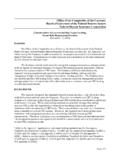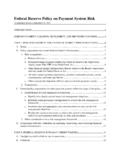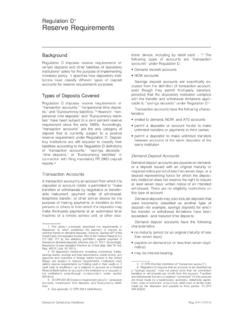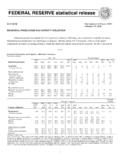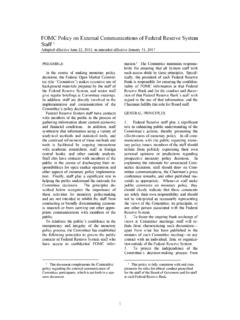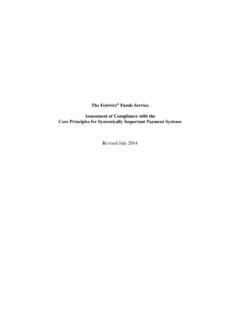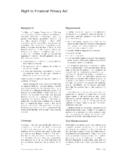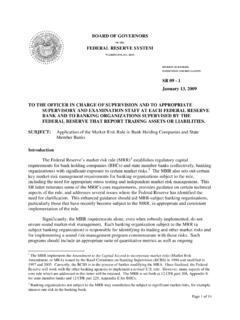Transcription of and Equal Credit Opportunity (Regulation B)
1 federal Fair Lending Regulations and Statutes Equal Credit Opportunity (Regulation B) Background The Equal Credit Opportunity Act (ECOA) of 1974, which is implemented by the Board s Regulation B, applies to all creditors. The statute requires finan cial institutions and other firms engaged in the extension of Credit to make Credit equally available to all creditworthy customers without regard to sex or marital status. Moreover, the statute makes it unlawful for any creditor to discriminate against any applicant with respect to any aspect of a Credit transaction (1) on the basis of race, color, religion, national origin, sex or marital status, or age (provided the applicant has the capacity to con tract); (2) because all or part of the applicant s income derives from any public assistance pro gram; or (3) because the applicant has in good faith exercised any right under the consumer Credit Protection Act.
2 In keeping with the broad reach of the prohibition, the regulation covers creditor activities before, during, and after the extension of Credit . Under the ECOA, the federal reserve Board is responsible for drafting and interpreting the imple menting regulation. Enforcement responsibility, how ever, rests with a creditor s functional regulator or, for any category not so assigned, with the federal Trade Commission. A synopsis of some of the more important points of Regulation B follows. Prohibited Practices Regulation B contains two basic and comprehen sive prohibitions against discriminatory lending practices (section ): A creditor shall not discriminate against an applicant on a prohibited basis regarding any aspect of a Credit transaction.
3 A creditor shall not make any oral or written statement, in advertising or otherwise, to appli cants or prospective applicants that would discourage, on a prohibited basis, a reasonable person from making or pursuing an application. Note that the regulation is concerned not only with the treatment of persons who have initiated the application process, but also with lender behavior before the application is even taken. Lending officers and employees must be careful to take no action that would, on a prohibited basis, discour age anyone from applying for a loan.
4 For example, a bank may not advertise its Credit services and practices in ways that would tend to encourage some types of borrowers and discourage others on a prohibited basis. In addition, a bank may not use prescreening tactics likely to discourage potential applicants on a prohibited basis. Instructions to loan officers or brokers to use scripts, rate quotes, or other means to discourage minority applicants from applying for Credit are also prohibited. The prohibition against discouraging applicants applies to in-person oral and telephone inquiries as well as to written applications.
5 Lending officers must refrain from requesting prohibited information in conversations with applicants during the pre interview phase (that is, before the application is taken) as well as when taking the written application. To prevent discrimination in the Credit -granting process, the regulation imposes a delicate balance between the creditor s need to know as much as possible about a prospective borrower and the borrower s right not to disclose information irrel evant to the Credit transaction. To this end, the regulation prescribes rules for taking, evaluating, and acting on applications as well as rules for furnishing and maintaining Credit information.
6 Rules for Taking Applications Section Regulation B prohibits creditors from requesting and collecting specific personal information about an applicant that has no bearing on the applicant s ability or willingness to repay the Credit requested and could be used to discriminate against the applicant. Applicant Characteristics Creditors may not request or collect information about an applicant s race, color, religion, national origin, or sex. Exceptions to this rule generally involve situations in which the information is necessary to test for compliance with fair lending rules or is required by a state or federal regulatory agency or other government entity for a particular purpose, such as to determine eligibility for a particular program.
7 For example, a creditor may request prohibited information In connection with a self-test being conducted by the creditor (provided that the self-test meets certain requirements) For monitoring purposes in relation to Credit secured by real estate To determine an applicant s eligibility for special-purpose Credit programs consumer Compliance Handbook Reg. B 1 (1/06) Fair Lending: Equal Credit Opportunity Information about a Spouse or Former Spouse ( (c)) A bank may not request information about an applicant s spouse or former spouse except under the following circumstances: The non-applicant spouse will be a user of or joint obligor on the account.
8 (Note: The term user applies only to open-end accounts.) The non-applicant spouse will be contractually liable on the account. The applicant is relying on the spouse s income, at least in part, as a source of repayment. The applicant resides in a community property state, or the property upon which the applicant is relying as a basis for repayment of the Credit requested is located in such a state. The applicant is relying on alimony, child sup port, or separate maintenance income as a basis for obtaining the Credit .
9 Marital status ( (d)(1) and (d)(3)) Individual Credit When an applicant applies for individual Credit , the bank may not ask the applicant s marital status. There are two exceptions to this rule: If the Credit transaction is to be secured, the bank may ask the applicant s marital status. (This information may be necessary to determine what would be required to gain access to the collateral in the event of default.) If the applicant either resides in a community property state or lists assets to support the debt that are located in such a state, the bank may ask the applicant s marital status.
10 (In community property states, assets owned by a married individual may also be owned by the spouse, thus complicating the accessibility of the collat eral in the event of default.) Joint Credit When a request for Credit is joint (made by two or more individuals who will be primarily liable), the bank may ask the applicant s marital status, regardless of whether the Credit is to be secured or unsecured, but may use only the terms married, unmarried, and separated. This requirement applies to oral as well as written requests for marital status information.
